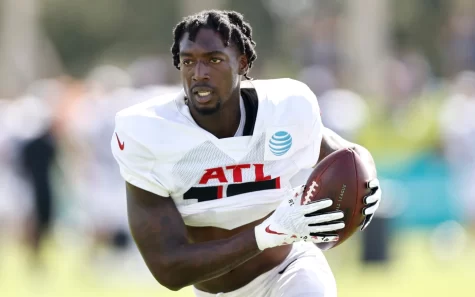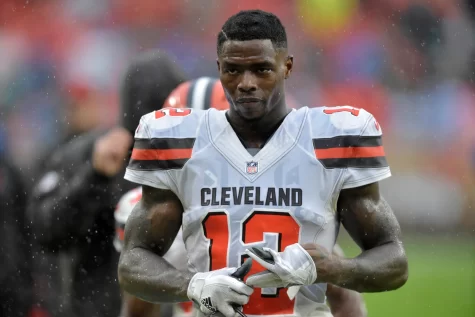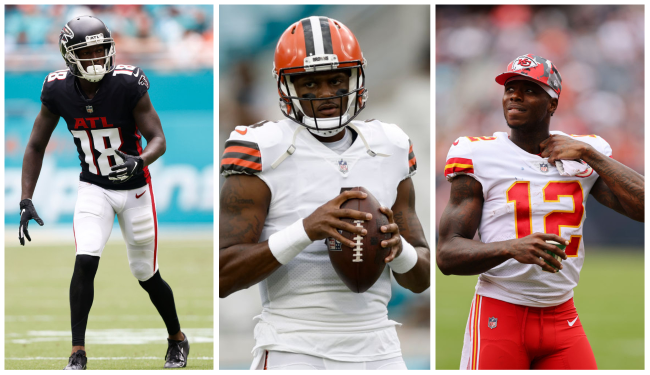NFL: A History of Inconsistent Suspensions
The NFL’s personal conduct policy is in dire need of revision.
On July 25, 2014, NFL superstar Ray Rice was suspended for just 2 games by commissioner Roger Goodell after a video surfaced of him beating a woman in an elevator. Approximately 8 years later, standout quarterback Deshaun Watson received a mere 11 game suspension for allegedly sexually assaulting 27 masseuses. The NFL’s questionable policy on player suspensions dates back to 2010, and not much has changed since. The NFL continues to be too nonchalant towards sexual assault and domestic violence, yet extremely punitive on gambling and weed. These suspensions are the product of the NFL’s suspension system being a failed form of justice designed to protect the league’s image rather than act as an impartial judge of action.

One thing becomes astoundingly clear when looking at NFL suspensions: the NFL does not care about a semblance of justice for victims, but rather focuses on protecting their sponsors and image. The best example of this is seen with Atlanta Falcons wide receiver Calvin Ridley. Ridley made the foolish mistake of betting a $1,500 on six bets for his team to win and individual players to do well. After an investigation by the NFL, Ridley received an indefinite suspension that will include at minimum the entire 2022-2023 season. The punishment given to Ridley, however, makes little sense when considering that Ridley was not even playing at the time—meaning that he could in no way manipulate the results of the bets. Ridley made a statement prior to the incident stating that he was taking a break from football to focus on his mental health.
The NFL’s choice to suspend Ridley may seem perplexing at first but becomes obvious when considering the NFL’s past. The NFL has had controversies about rigging games for over 50 years. It all stems from Super Bowl 3 when the heavy underdog American Football League Champion (AFL) New York Jets beat the National Football League champion (NFL) Baltimore Colts. That part alone may not mean much, but Jets quarterback Joe Namath before the game infamously proclaimed, “We’re going to win Sunday. I guarantee it.” This led many, including Colts defensive lineman Bubba Smith, to accuse the league of fixing the game in order to give the AFL, who were considered much worse at the time, some credibility.
The NFL rightly worries about the public perception on the legitimacy of their games, and has given every betting NFL player an indefinite suspension since 1970, the year after that Super Bowl. This goes to show the drastic lengths the NFL and Commissioner Goodell will go to protect the league’s image.

Another example of the NFL’s bias is seen in their treatment of wideout Josh Gordon. The Browns superstar burst onto the scene in 2013, leading all NFL wide receivers in receiving yards—including legends such as Calvin Johnson and Antonio Brown. He also did this while only playing 14 games on the season, missing the first two games due to a weed suspension.
The following year, disaster struck for the young wideout. His tests for marijuana came back positive. Merely a month after the suspension of Ray Rice, Gordon received an entire year suspension. Under the new policy however, he only had to serve 10 games before coming back. But then he tested positive for the next year, and the next, and 3 more times after that. The irony in Gordon’s suspensions is that the receiver he beat in receiving yards, megastar Calvin Johnson, has stated that he used marijuana every week while playing in the league, but no suspensions were ever levied against him. One could speculate that this was because Calvin Johnson was one of the most popular players in the NFL–leading all receivers in jersey sales that year. The NFL’s choice to punish players instead of helping them finally changed last year with THC no longer being a suspendable offense. The NFL didn’t have some miraculous change of heart, but only made this change as public sentiment swayed in a different direction after 30 years, with marijuana being legalized in most states and accepted in most regions. In large part due to this rule change, Gordon is back on an NFL team for the first time in 3 years and has played his first snap in over 4 years. This is a testament to how star power can cover up nearly any action in the eyes of the league.
Evidently, the NFL holds the integrity of the sport to a very high regard, handing season long suspensions for even the slightest indiscretion. However, this dedication to justice isn’t the same when it comes to the NFL’s personal conduct policy. This difference is clearly seen when examining the length of suspensions for violations of the substance abuse policy versus violations of the personal conduct policies. The mode of substance abuse suspensions is 4 games while the mode of a personal conduct violation is only 1. The whole personal conduct policy, in fact, was originally made after huge backlash from fans and the media for not punishing Chris Henry, Adam Jones, and Tank Johnson, who all committed serious federal offenses like aggravated assault, felony coercion, and unlawful possession of arms. This is the reason why there are so few personal conduct suspensions from before 2007: The NFL simply had no incentive to suspend anyone. The NFL was making money, the players were being disciplined by the government, and the players were still able to play. However, with the popularity of the NFL increasing, the public began to take more interest in the actions of players. Therefore, the NFL was forced to suspend players to fend off media and fan criticism. Media controversy, sponsorship cancellations, and boycotts are a lot more expensive than putting a single player on the exempt list for a year.
This knee-jerk reaction to criticism is essentially the bread and butter of the NFL personal conduct policy. When Ray Rice was charged with domestic violence in 2014, the NFL only gave him a two game suspension. However, as the proof of him committing the crime grew, so did media and fan backlash, which led to the development of the NFL’s domestic violence policy. In this situation, the NFL allegedly knew that he committed the crime even before the evidence was leaked, but chose to say nothing. Why? Because to the NFL, the profits are all that matters, and having Ray Rice play is a whole lot better for their profit margins, seeing as he was the 28th most popular player in the league in 2014. When the evidence was leaked, the NFL swiftly suspended him and the Ravens released him, hinting that they had a plan to conceal any misdoing if the public ever found out. Furthermore, Bud Light and Pepsi–two of the league’s biggest sponsors–were uncomfortable with the NFL’s decision on Rice. When faced with losing them or losing Rice, the choice was obvious. The NFL will not suspend a player unless the backlash over them playing is greater than the amount the league would make by letting him play.
One example of this is when the NFL refused to suspend Chiefs WR Tyreek Hill of child abuse charges, even though there were audio recordings of him engaging in abuse. The NFL claimed that they could not prove that it was Hill who caused the injuries, and that any threats did not warrant discipline. This is where the vague wording of the NFL’s personal conduct policy comes into play. Commissioner Goodell has the final word on every single suspension, regardless of the rules, because the policies are far too vague. For example, the minimum penalty for domestic violence is a 6 week suspension. However, Goodell put various clauses in the policy, such one about mitigating circumstances and aggravating circumstances, that allow him to essentially make the most economically profitable decision.
The policy is just a figurehead, existing only to give the impression of due process and the NFL caring about the character of their players. That needs to change. Especially with their poor handling of the recent Deshaun Watson case, the league needs to either tighten up and detail their policies so that they are balanced and reflective of the severity of the crime, or they need to completely stop being able to hand out suspensions and move that to a different ruling body.
With all of these heinous actions by the NFL, one might presume that the NFL is in a downward spiral—like the MLB—but this could not be further from the truth. As of now, the NFL is at an all time high, with the biggest companies in the world fighting for a crumb of it. This was most recently seen with Amazon paying over a billion dollars a year for Thursday Night Football to be shown exclusively on Amazon’s streaming network: Prime Video. Frankly, the NFL can do no wrong as of now when it comes to their yearly income. The silver lining in all of this is that we see the league respond to public outcry. If people choose to speak up, the NFL may have no choice but to alter their way of business.


